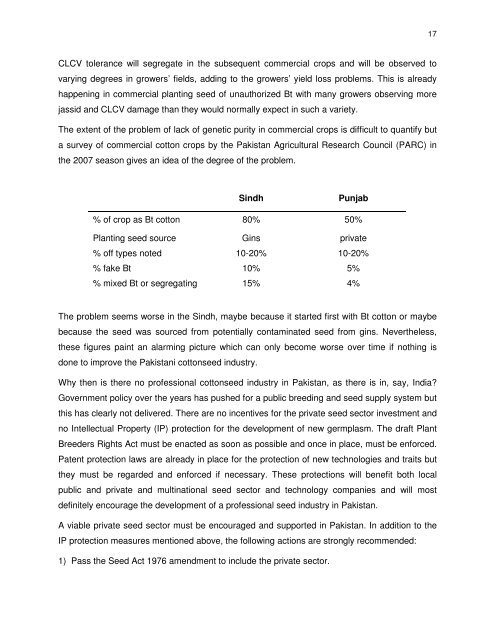ChangingCottonLandscapeNeilForrester
ChangingCottonLandscapeNeilForrester
ChangingCottonLandscapeNeilForrester
Create successful ePaper yourself
Turn your PDF publications into a flip-book with our unique Google optimized e-Paper software.
CLCV tolerance will segregate in the subsequent commercial crops and will be observed to<br />
varying degrees in growers’ fields, adding to the growers’ yield loss problems. This is already<br />
happening in commercial planting seed of unauthorized Bt with many growers observing more<br />
jassid and CLCV damage than they would normally expect in such a variety.<br />
The extent of the problem of lack of genetic purity in commercial crops is difficult to quantify but<br />
a survey of commercial cotton crops by the Pakistan Agricultural Research Council (PARC) in<br />
the 2007 season gives an idea of the degree of the problem.<br />
Sindh Punjab<br />
% of crop as Bt cotton 80% 50%<br />
Planting seed source Gins private<br />
% off types noted 10-20% 10-20%<br />
% fake Bt 10% 5%<br />
% mixed Bt or segregating 15% 4%<br />
The problem seems worse in the Sindh, maybe because it started first with Bt cotton or maybe<br />
because the seed was sourced from potentially contaminated seed from gins. Nevertheless,<br />
these figures paint an alarming picture which can only become worse over time if nothing is<br />
done to improve the Pakistani cottonseed industry.<br />
Why then is there no professional cottonseed industry in Pakistan, as there is in, say, India?<br />
Government policy over the years has pushed for a public breeding and seed supply system but<br />
this has clearly not delivered. There are no incentives for the private seed sector investment and<br />
no Intellectual Property (IP) protection for the development of new germplasm. The draft Plant<br />
Breeders Rights Act must be enacted as soon as possible and once in place, must be enforced.<br />
Patent protection laws are already in place for the protection of new technologies and traits but<br />
they must be regarded and enforced if necessary. These protections will benefit both local<br />
public and private and multinational seed sector and technology companies and will most<br />
definitely encourage the development of a professional seed industry in Pakistan.<br />
A viable private seed sector must be encouraged and supported in Pakistan. In addition to the<br />
IP protection measures mentioned above, the following actions are strongly recommended:<br />
1) Pass the Seed Act 1976 amendment to include the private sector.<br />
17


